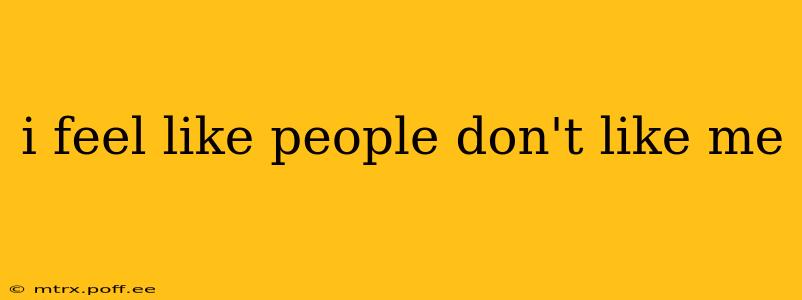Feeling Like People Don't Like You: Understanding and Overcoming Social Isolation
Feeling like people don't like you is a common and painful experience. It can lead to feelings of loneliness, isolation, and low self-esteem. However, it's crucial to remember that this feeling isn't necessarily a reflection of reality. Often, our perceptions are influenced by our own insecurities and biases. This article will explore the reasons behind this feeling and offer strategies to overcome it.
Why Do I Feel Like People Don't Like Me?
This feeling can stem from various sources, both internal and external. Let's delve into some common reasons:
-
Low Self-Esteem: Individuals with low self-esteem often interpret ambiguous social cues negatively. A simple oversight might be perceived as a deliberate slight, fueling feelings of rejection. Addressing underlying self-esteem issues is crucial for overcoming this.
-
Social Anxiety: Social anxiety can make social interactions feel overwhelmingly difficult. Fear of judgment or rejection can lead to avoidance, reinforcing the feeling of being disliked.
-
Past Negative Experiences: Past traumas, bullying, or hurtful relationships can leave lasting scars, making it difficult to trust others and leading to a pervasive sense of being unlikeable.
-
Negative Self-Talk: Our inner dialogue profoundly impacts how we perceive ourselves and others. Constant negative self-talk – criticizing your appearance, actions, or personality – can distort your perception of how others view you.
-
Misinterpretation of Social Cues: Sometimes, we misinterpret subtle cues or nonverbal communication. What might seem like disinterest could simply be someone having a bad day or being preoccupied.
What are the Signs That People Don't Like Me?
It's important to distinguish between genuine dislike and misinterpretations. While some behaviors might suggest a lack of connection, others are often harmless. Consider these points:
-
Consistent Exclusion: If you're consistently left out of social events or conversations, it might signal a problem. However, sometimes people are busy or have other commitments.
-
Avoidance: If people actively avoid your company or seem uncomfortable around you, it warrants reflection. However, consider whether there might be other reasons for this avoidance.
-
Negative Body Language: While not always indicative of dislike, consistent negative body language like eye rolls or dismissive gestures could be a cause for concern.
How Can I Tell if People Actually Dislike Me?
There's no foolproof way to know for certain. However, focusing on patterns of behavior rather than isolated incidents is key. Consider:
-
Multiple Sources: Does this feeling come from one person, or several? Multiple negative experiences might be more indicative of a genuine issue.
-
Context Matters: Are there specific situations or groups where you feel this way? Identifying these situations can help determine the root cause.
-
Self-Reflection: Is your perception aligned with your behavior? Are you contributing to the situation?
How Can I Improve My Relationships and Feel More Liked?
Overcoming this feeling requires proactive steps:
-
Improve Self-Esteem: Engage in self-care activities, celebrate your accomplishments, and challenge negative thoughts.
-
Practice Self-Compassion: Treat yourself with the same kindness and understanding you would offer a friend.
-
Develop Social Skills: Take classes or workshops on communication and social skills. Practice active listening and engaging in conversations.
-
Seek Professional Help: A therapist can provide support and guidance in addressing underlying issues contributing to your feelings.
-
Focus on Building Genuine Connections: Engage in activities and join groups based on your interests. Building connections takes time and effort, so be patient and persistent.
Feeling like people don't like you is a challenging experience, but it's not insurmountable. By understanding the underlying causes and taking proactive steps, you can improve your relationships and cultivate a stronger sense of self-worth. Remember, seeking support from friends, family, or a professional is a sign of strength, not weakness.
